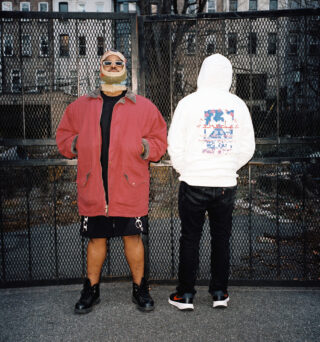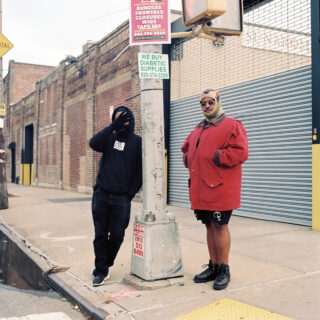NYC rap heavyweights Armand Hammer: “This is the deepest collaboration”
Billy Woods and Elucid flipped the script to make their incredible new record

Billy Woods and Elucid flipped the script to make their incredible new record
A distorted voice asks: “How does it feel?”
The seemingly innocuous question placed midway through ‘When It Doesn’t Start With A Kiss’, the fourth song off Armand Hammer’s latest album, We Buy Diabetic Test Strips [WBDTS], reveals itself to ultimately have plagued the NYC duo for a decade – and feels especially pertinent now.
Since their inception a decade ago, Armand Hammer, made up of Billy Woods and Elucid, have known society was heading in a certain direction. They have been warning us about the state of the world. WBDTS feels like the culmination of that prophesying as they look to capture the surrealist absurdity of the current moment.
Over 15 tracks, the duo possesses a sense of propulsive, breathless urgency. They float on top of beats which defy conventional boxes; words tumble out of their mouths faster than they catch them, reminding listeners that they may be the two most intelligent rappers in the game, their bars deserving years of examination. WBDTS is atmospheric, moody and full of twists and turns; a cohesive project which demands multiple listens.
“Previous albums were vignettes, puzzle pieces that fit together,” Woods says, his voice soft, welcoming. “This album was more back and forth, back and forth in terms of ideas, in terms of collaborators, in terms of beats. There was a lot of exchange.”
This is epitomised in the album’s incorporation of live instrumentation coupled with featuring an array of innovative producers who took the sessions and chopped and changed them to their fully realised form. Names scattered throughout the album include El-P, JPEGMAFIA, Kenny Segal, DJ Haram and Black Noi$e. Meanwhile, guest vocalists Pink Siifu, Moor Mother, Junglepussy, Cavalier, Curly Castro and Moneynicca – the moonlighting frontman of Philly punk band Soul Glo – are also part of the album’s lineup.
The album title itself stems from a piece of everyday absurdity, like a Seinfeld episode condensed. “I walk around New York a lot,” Woods says. “And there are these signs that are posted up everywhere. And that was one of the things that I would see: ‘We buy diabetic test strips.’ I was like, ‘What is this?’”
Elucid echoes him, stating: “It’s everywhere. On every lamppost and pole in central Brooklyn. But we were talking to someone else about this, and they don’t live very far from us, a few neighbourhoods over which is much more affluent, and the signs don’t exist. He’s never seen it before. But it’s ten minutes from his door. It’s just a commentary on the everyday inequity, a question like, ‘What is this?’”
“When I saw that sign,” Woods continues, “I started to think about how there is something here that I don’t understand. Looking into it and seeing how these worlds and economies and realities that are right under all of our noses in the city. That, you know, for different people, they’re invisible depending on who you are: bottom, top, middle, and there’s different worlds you can move through and things that are going to your eyes sliding right over somebody else.”

WBDTS is the latest offering from a duo who have not only carved a path unto themselves in a cluttered field but developed a sound that is uniquely theirs. In the ten years they have been working together, Armand Hammer has grown to allow each member the necessary space for their quick-fire wit and barbs to come to the fore.
“Woods’ writing has gotten more humorous,” Elucid says. “I think it’s more detailed and the delivery is slicker.” Woods echoes his bandmate, saying, “I feel like Elucid still writes the way he writes, maybe now, sometimes there’s more of a tendency to tell a more straight-line story.”
Their collaborative sword was first sharpened when the duo met in 2012. Woods, who runs the label Backwoodz, suggested they form a duo after having Elucid appear on compilations and trading verses with him. Throughout four albums released in as many years, Armand Hammer have honed their joint craft. The LPs Rome, Paraffin, Shrines and Haram each brought something different; each time, they reconsidered how to elevate themselves. It’s an unparalleled run of releases which, it could be argued, peaked with 2021’s Haram. Produced entirely by The Alchemist, the pre-order for the release crashed the Backwoodz website and became their most commercially successful project.
But if anyone is hoping for the formula of Haram to be replicated, Woods and Elucid want to swat those expectations away. With each project comes a new mode of thinking, a new way to tackle the now, and WBDTS is a wholly different beast, which Woods wants to reiterate.

“First of all, Al [The Alchemist] has other things to do,” he quips. “But that’s pretty much how we operate; to try and do something new, find new challenges. We’re definitely excited about doing another record with Al at some point, but, you know, in the meantime, we’re going to push each other and ourselves to new places and new things to bring to the table. I don’t want to be bored. And that way, if I’m not bored, hopefully [other] people won’t be bored.”
Armand Hammer flipped the script on WBDTS. The live instrumentation coupled with the atmospherics and precise lyricism makes it arguably their strongest album – and funniest project – yet. With song titles like ‘Woke Up and Asked Siri How I’m Gonna Die’, the duo trade bars and verses throughout like a high-stakes tennis match, each verse an indicator to see who can do better than the previous one. Yet there is seemingly no competition between them, just two minds in sync. And the trust they have for one another extended to all the creators of the album.
“It was our first time working with [those] people,” Woods says. “It’s much more open conceptually. On Haram, for example, for me at least there’s a lot of different moods happening, even the things that bounce against that, like black sunlight, like black joy.”
“The magic of when the idea starts to come together was super ill to witness,” Elucid says. “That exemplifies the trust. I think trusting in those moments and being lucky enough to record a few of those, and handing it over to producers, those raw sessions, I’m trusting that I’m going to get a fire pack.”
“It’s these interpersonal relationships,” Woods says. “I think that watching music being made is really cool. And this way, with a room for the players, these people didn’t know each other until they’d walk into the room, and they met each other in the studio for the first time. This is the deepest collaboration that we collectively or individually have had.”
Photography by Alexander Richter